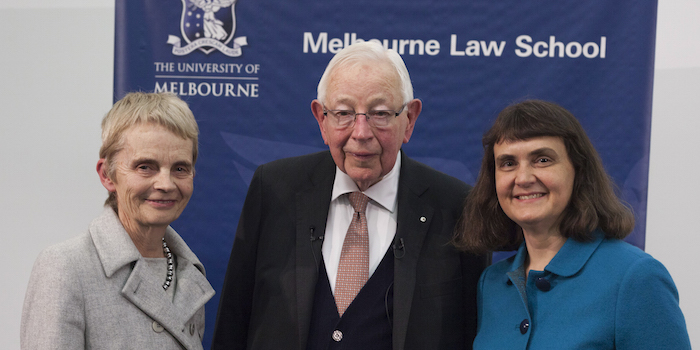The Honourable Sir Anthony Frank Mason AC KBE GBM QC can recall many highlights from his 23 years as a Justice of the High Court of Australia, including eight years as Chief Justice (1987-1995).

Among his career high points was the landmark decision made in Cole v Whitfield on the meaning of Constitution section 92, in which contradicting regulations between states put a burden on interstate trade; and Mabo v Queensland, which introduced native title and was later immortalised in the classic Australian film The Castle.
He acknowledges these judgments, among others, with subtle pride and a sense of the extent to which they changed the nation for the better.
"Cole v Whitfield was the judgment I took more pride in than anything else because section 92 had been a troublesome section for the best part of a century, and I thought we managed effectively to give the section an interpretation that didn't solve all the difficulties but it did solve quite a large number of difficulties which had persisted over the years," he says.
"I think Mabo (in which I agreed with the judgment of Brennan J) was a great achievement because I think Mabo did something – perhaps not nearly as much as people think – to address the problem created by the fiction that resulted in people believing Indigenous people had no interest in the lands that they had occupied traditionally, and I think Mabo was a very important decision."
Sir Anthony dismisses any disappointment.
"You tend to forget disappointments; you only remember the good things in life, and you remember them with perhaps a rosier complexion than they actually had," Sir Anthony says.
"But there were some cases where I was surprised rather than disappointed with the result."
Sir Anthony says his dissenting judgment in Hospital Products Ltd v United States Surgical Corporation, whereby the majority held that Alan Blackman had breached his contract with USSC, and did not owe fiduciary obligations to it, was one such example.
It was his experience in the highest court in the nation that shaped his career, and what he says were "exciting times."
Sir Anthony, now 90, distinctly remembers the turbulence of the Murphy Affair in the mid-1980s when his colleague Justice Lionel Murphy was convicted of one of two charges of attempting to pervert the course of justice over allegations he had attempted to influence a court case against Sydney lawyer Morgan Ryan.
A subsequent appeal to the NSW Court of Appeals quashed Murphy's conviction on the grounds that the trial judge had misdirected the jury, and, in a second trial, Mr Murphy was found not guilty.
He died of terminal cancer later that year.
"That was disruptive but, on the other hand, the Court managed to proceed with its work in the usual way, and that indicates in a sense how well-established the Court was and how it managed, notwithstanding, something that was quite unexpected and continued to go about its work in the usual way," he says.
"That was probably the major incident that occurred."
That is, except one other.
Sir Anthony's involvement in "The Dismissal" in November 1975 has often, to some, overshadowed his long and distinguished career.
Yet, despite the four decades that have passed since the Constitutional crisis that resulted in then Prime Minister Gough Whitlam being cast from office, the former judge remains tight-lipped on the subject.
"I think it's well known that I was a friend of Sir John Kerr, and I did give Sir John Kerr certain advice. That's probably all I need to say about that."
Discussing his time in retirement from the High Court, including his continuing role as a non-permanent judge of the Hong Kong Court of Final Appeal, laments how the legal profession has changed in recent years.
He cites the high cost of litigation as one of the challenges of today.
"I think that is the biggest challenge facing the legal profession and the courts. That, and getting a final decision quickly on important questions of the law," he says.
And behind the nonagenarian's success and longevity in the law has stood his "tremendous" supporter, his wife of 65 years Lady Patricia Mason, for whom Sir Anthony has unwavering affection and gratitude.
"She's been marvellous. I couldn't have achieved what I have achieved without her unflinching support."
Sir Anthony Mason delivered the 21st Annual Sir Anthony Mason Lecture, his third time since its inception, on the topic "Proportionality and its use in Australian Constitutional Law" on Thursday 6 August 2015 at Melbourne Law School.
Image: Sir Anthony Mason with Laureate Professor Emeritus Cheryl Saunders AO and MLS Dean Professor Carolyn Evans
Credit: Stuart Chen